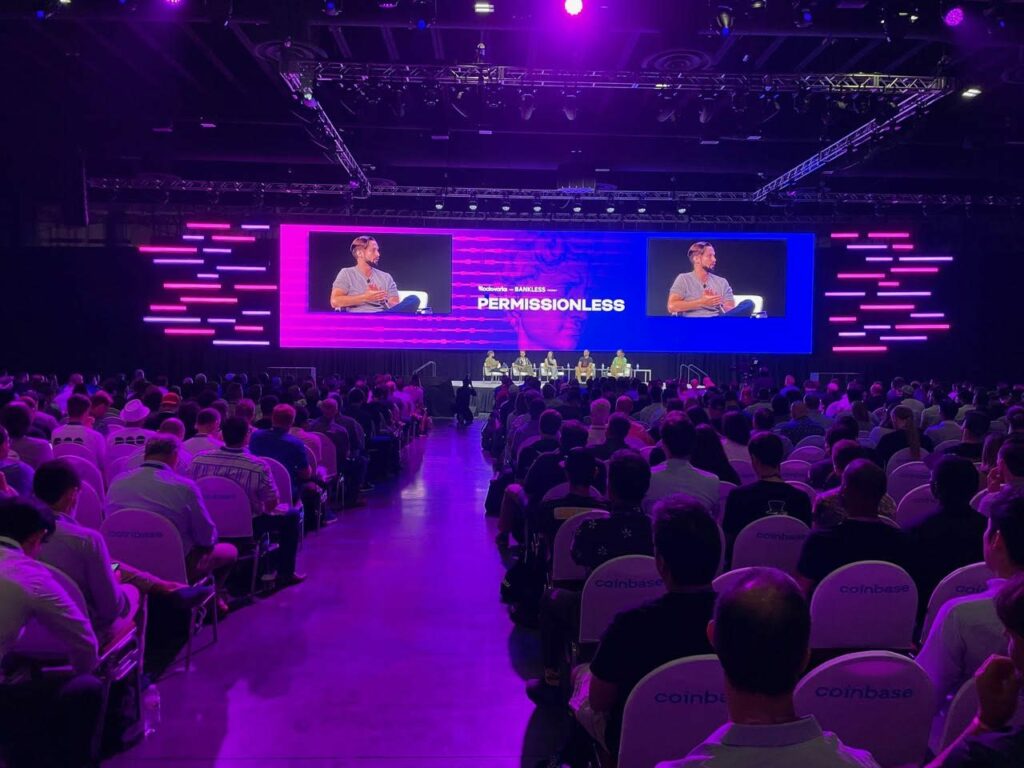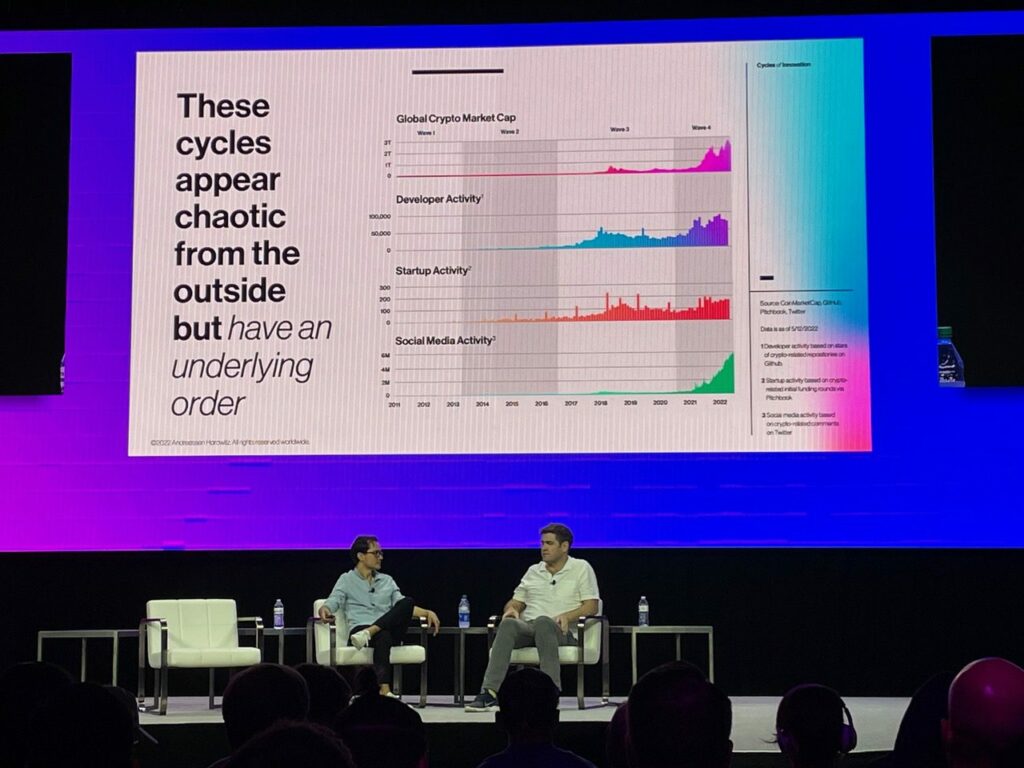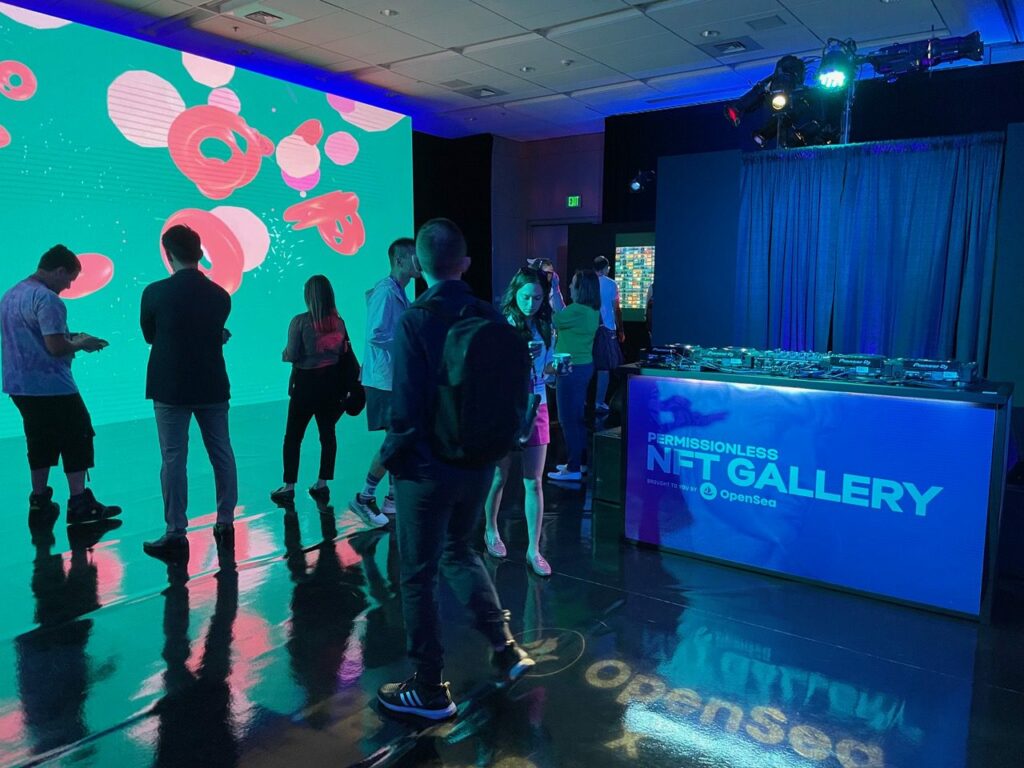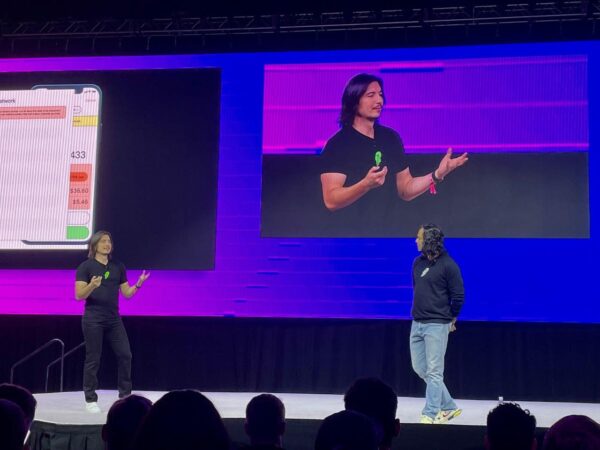By Riley Kaminer
As the momentum from last month’s Miami tech month continues to build, it also moves northward with this year’s Permissionless conference in West Palm Beach.
The summit, organized by crypto-focused media company Blockworks, attracted upwards of 5,000 web3 enthusiasts and experts from around the world. Across the three days of the conference, a series of speakers touched on everything from DeFi to the metaverse to NFTs.

The main hall of the Palm Beach Convention Center was transformed into a festival of top tech in the web3 space. And it wouldn’t be a crypto conference without the parties. Frens and degens took over West Palm Beach’s burgeoning warehouse district, bar crawled on Clematis, and enjoyed some electro from top DJs.
Refresh Miami was there along the way. Here are some of the main takeaways.
Diamond hands were on full display
The timing for this year’s conference was far from ideal. Cryptocurrency markets experienced extreme volatility last week. Terra stablecoin UST and LUNA, the token that was designed to help the stablecoin keep its peg to the US dollar, collapsed.
But speakers, attendees, and LUNAticks alike were unphased by the volatility.
Chris Dixon, who leads Andreessen Horowitz’s web3 practice, urged investors to take a longer-term perspective. “Maybe we’ve had a bad week or a bad year,” he said in one of the opening addresses to attendees. “But if you zoom out, is this going to be a bad three years?”
“Probably not,” is the answer to this question, in Dixon’s estimation. In fact, he called this a “golden period” for crypto.
“There was a decade when social media was a joke. Then suddenly it flips the switch and it becomes so important that people are calling for it to be governed or nationalized. There is no intermediary period.”
“I’m very excited, and it’s great to see all these people here,” he continued. That switch might be flipped sooner rather than later, he argued. “There are a lot of great ideas and infrastructure. The airplane is flying but it’s shaking and we’re trying to fix it in the air.”

A deluge of product announcements: Robinhood, Coinbase, Ledger, and more
Dixon noted that this was the first in-person conference he had attended since 2018 – a sentiment echoed by other participants. This pent-up energy led to a slew of new product announcements.
Perhaps most notably, Robinhood co-founders Vlad Tenev and Baiju Bhatt [pictured at top of post] graced the main stage to announce the launch of a new crypto-focused app. This product will include a non-custodial wallet, enabling users to manage their cryptocurrency, NFTs, and other digital assets. These new crypto features will begin to be available at the end of the summer, with the goal of making the wallet available to all users by late 2022.
Coinbase Chief Product Officer Surojit Chatterjee beamed in virtually to outline the company’s plans to become a gateway for its 98 million users to access everything web3. Chatterjee announced that developers will soon have access to Coinbase’s payment API, enabling them to quickly accept payments in the more than 100 tokens on Coinbase’s platform. He signaled the company’s “any chain, one wallet” vision, underscoring the goal to make managing digital assets as easy as possible for consumers. Chatterjee also presented Coinbase’s foray in the NFT space, asserting that new NFTs will be displayed in a user’s wallet instantly after a purchase.

Web3 wallet Ledger announced new product Connect, a browser extension that will streamline the process of connecting users’ wallets to web3 projects directly from their desktop. And Permissionless organizer Blockworks announced a new research and data platform for crypto.
Eyes on DeFi
Many of the panels focused on decentralized finance (DeFi), or the concept of using cryptocurrencies and blockchain technology to manage financial transactions while circumventing traditional intermediaries.
Joe Hoffend of DeFi platform Foundry underscored the need for legacy financial institutions to become more forward thinking in the web3 age. “Banks will most likely still have some purpose, but I think they’re going to become less relevant if they don’t innovate,” he said during a panel discussing DeFi as the “financial backbone of the new economy.”
“Staking is the entry point into yield earning for more traditional banks,” added Konstantin Richter, blockchain OG and founder of Blockdaemon.
The panel debated the role DAOs can and should play in the DeFi movement. “The best thing about a DAO when structured correctly is that it reduces friction,” said ShapeShift founder Erik Voorhees. Before his company became a DAO, he explained that hiring foreign talent was a compliance headache. With the DAO structure, these issues melt away.
Expo showcases some of the top web3 projects
The expo portion of Permissionless mostly highlighted the largest, most global crypto companies – from Coinbase to Metamask to Nansen.
However, there was local representation from Natalia Karayaneva, CEO at Miami-based real estate transaction platform Propy. The startup has developed a platform for buying and selling houses using cryptocurrency, or even as an NFT.
“There’s a lot of positivity in the air among the hundreds of entrepreneurs in attendance, despite the recent collapse of Terra. And we have seen a lot of institutional investors reach out, asking how web3 is changing traditional industries like real estate,” said Karayaneva. “We are very thankful to the organizers for putting together such an exciting event.”

Another major theme among participants was web3 gaming, including Splinterlands and Project SEED. Dubai-based DIG showcased Kart Racing League, which they call the world’s first 3D NFT play-to-earn kart racing game.
And it wouldn’t be a web3 event without the NFTs! Marketplace OpenSea sponsored a series of galleries displaying NFTs on digital screens, complete with accompanying mood lighting and soundscape.

READ MORE ON REFRESH MIAMI:
- RECUR will soon open NFT platform to creators of all sizes
- Leaders put tech in the spotlight at Aspen Ideas: Climate conference in Miami Beach
- Got crypto questions? Defy Trends is a new, Miami-based startup that can help
- Superlogic lands $7.6M strategic round to pioneer the future of loyalty points - April 19, 2024
- AI, climatetech and healthtech reign supreme on Day 1 of eMerge Americas’ 10th anniversary - April 18, 2024
- Brought together by tech, kept together by culture: Miami’s protagonistic role in LatAm’s startup story - April 15, 2024





